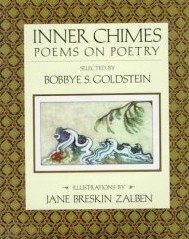|
Day Two: Metapoetry
  Metapoetry is poetry about poetry,
especially self-conscious poems that focus on objects or items
associated with writing or creating poetry. These might include
puns on the word “feet” for example, referring on one
level to the body part, and on another to the metrical feet of
a poem. Metapoetry is poetry about poetry,
especially self-conscious poems that focus on objects or items
associated with writing or creating poetry. These might include
puns on the word “feet” for example, referring on one
level to the body part, and on another to the metrical feet of
a poem.
Inner Chimes,
edited by Bobbye Goldstein and illustrated by Jane Breskin Zalben,
offers a wonderful introductory selection of 20 poems that investigate
the creation, joy, frustration and delight to be found in the
poet’s craft. Zalben’s illustrations, like cameo miniatures,
are intricate and tightly designed ornaments that evoke the poem's
likeness without overwhelming its imagery. For example,
- Gerda Mayer’s suggestion that
the poet carries a poem “carefully, / nervously, / in his
head / like a saucer of milk” is illustrated with a blue
willow cup.
- Poet Naoshi Koriyama compares
a poem to a water-lily bud, which, like the book itself, will
allow readers to see a poem “gradually unfolding / Revealing
its rich inner self / As one reads it / Again / And over again.”
- Below X. J. Kennedy's “A
jumbled sight,/ The sheets I write!/ High time for paper clips/
To take a bite/ And grip them tight/ Between bright bulldog lips” is a picture of two bulldogs, a scattering of paper clips, and
a small pile of crumpled paper.
Also check out Poems on Poems or Metapoetry
for a broad selection of metapoems. Other types of metapoetry
involve self-conscious commentary on the poem's own genre or
on the process of creating the poem.
A fine example of such metapoetry is Jimmy
Santiago Baca’s “I Am Offering This Poem”:
|
S
5
10
15
20
25
30
|
I Am Offering This Poem by Jimmy Santiago Baca
I am offering this poem to you,
since I have nothing else to give.
Keep it like a warm coat,
when winter comes to cover you,
or like a pair of thick socks
the cold cannot bite through,
I love you,
I have nothing else to give you,
so it is a pot full of yellow corn
to warm your belly in the winter,
it is a scarf for your head, to wear
over your hair, to tie up around your face,
I love you,
Keep it, treasure it as you would
if you were lost, needing direction,
in the wilderness life becomes when mature;
and in the corner of your drawer,
tucked away like a cabin or a hogan
in dense trees, come knocking,
and I will answer, give you directions,
and let you warm yourself by this fire,
rest by this fire, and make you feel safe,
I love you,
It’s all I have to give,
and it's all anyone needs to live,
and to go on living inside,
when the world outside
no longer cares if you live or die;
remember,
I love you.
|
|
| |
|
|
| |
Baca’s poetry mingles his experiences of
rage and dispossession as a former convict with poetic narratives
of spiritual regeneration and renewed connection with his community
and ethnic heritage. In this poem, Baca uses a series of similes
to demonstrate what poetry is to him. He offers this poem, hoping
it can do for the reader what poetry has done for him. In numerous
interviews, Baca has talked about being transformed from an illiterate
prisoner to a celebrated poet who delights in the discovery and
expression of language.
Jimmy Santiago Baca, Hispanic poet with
an amazing life story, was the Tenth Poet in the Annual Thatcher Hoffman Smith Poetry Series
that the Center for Interpersonal Studies through Film &
Literature sponsors each spring. Baca was also interviewed for Oklahoma Humanities (November 2008).
Check out Baca’s official homepage. He also has pages at Poetry Foundation, with an instructional essay, and at Poets.org. On a PBS NewsHour, Baca talks about two new books, “Healing Earthquakes” and “A Place to Stand” (approximately 10 minutes in).
|
|
Your Turn: Write and illustrate your own metapoem. Be prepared
to present to the class. Your metapoems will be collected in a student anthology like this collection of student poems.
Listen to Baca read this poem.
|
